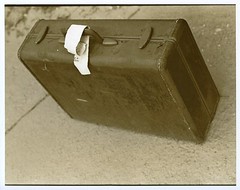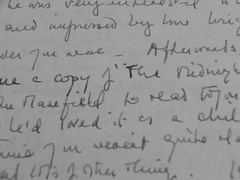
WG Sebald, The Emigrants (New Directions, 1996 [English translation]).
And the last remnants memory destroys
— Epigraph to Chapter One
I read this book over several months, putting it down then picking it up again weeks later. It’s a meandering and meditative text that gestures toward a point about memory, pain, and shame, rather than declaring it outright and obviously. Maybe my reading of it mirrored its style, wandering as I did. And even though I finished The Emigrants a while ago, I’ve had a hard time finding a way to sit down and write a quick account of it.
This is because Sebald’s work defies summary, genre, and the very categories of fiction and nonfiction.
I read Sebald, a longtime professor of literature and translation in Norwich, England, for the first time when I lived in Cincinnati some eight years ago. At the time, I was finishing up the writing of my first book, in which I’d been experimenting with various techniques in a nonfiction text, and I was fearful and uneasy about what I’d written.
It must have been my husband who bought Sebald’s Austerlitz: he’s always been more in tune with new veins in writing than I, but often has less patience for narrative, and tends to read prefer philosophy and criticism. So, even though Sean never finished Austerlitz, I gobbled it up. The book landed on my bedside table at exactly the right time, just when I needed someone to confirm that my own instincts on experimenting in nonfiction were valid. Sebald did that and more.
For me, Sebald was a revelation and a revolution.
The Emigrants, Sebald’s first book that appeared in English translation (he wrote in German), examines the lives of four individuals (Henry Selwyn, Paul Bereyter, Ambros Adelwarth, and Max Ferber) who, like the author (born in Germany in 1944), left their German or Germanized homes. In doing so, they, like their author, become strangers in the world.
The narrative’s characters are quirky and tragic, and through his interactions with them or their memories, and in his tracing of their paths through emigration, Sebald examines broader questions of foreignness and belonging, memory and shame, despair and adaptation, and of what remains of the old once a new home has been adopted.
World War II and the Holocaust return as constant themes in Sebald’s work. But while Austerlitz examines the Kindertransport, whereby many thousands of unaccompanied Jewish children were brought to England from Prague, and thus survived, the war and its horrors are a more oblique presence in The Emigrants.
There is the German-Jewish character of Max Ferber, that of Henry Selwyn whose roots lie in Lithuania, and the almost passing references to the dead who lost their lives in Nazi camps, but questions of Jewishness, of anti-Semitism, collaboration, or perpetration remain under the surface like an ache.
For the emigrants of his book, as for the author himself, home has become a problem and a memory. Permanently on the move, forever displaced, and no longer at ease anywhere (Sebald once said that his ideal post would be at a hotel in Switzerland), both the author and his characters embody rootlessness and restlessness.
Sebald started writing in his signature melancholy, calm voice late in life: only in his forties. And like so many greats, he was taken far too early. He died in 2001 in a car accident at the age of 57.
If you don’t know his work, I highly recommend it. Perhaps it will prove revelatory for you as well.
[Photo: cavale]




